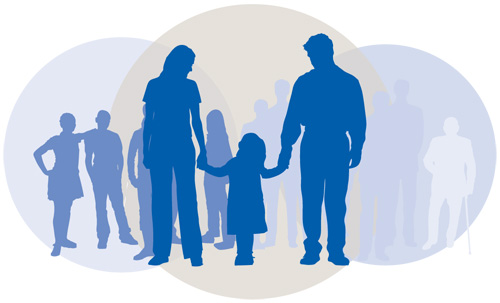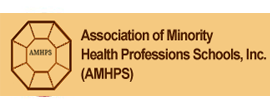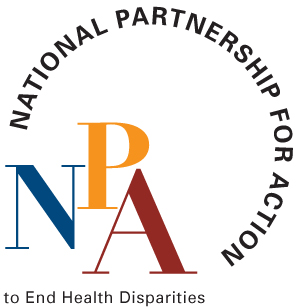OMHHE Past Program Summaries ~ 2011
AMHPS Program Dates
- Ferguson: June 1 – July 28, 2011
- StarLab: June 20 - July 15, 2011
- Symposium: March 25-26, 2011
- PHSF (see Morehouse/PHSI)
- EMRP (not implemented in 2011)
AMHPS is a non-profit, educational, scientific and charitable 501(c) (3) organization that provides support for professional education, research, and community service to promote optimum health among poor and minority people. It does this by engaging the collaborative resources, scholarship, and technology of minority health professions schools.
The Objectives of AMHPS are to:
1) Promote and support research that contributes to the advancement of knowledge and treatment of diseases, disabilities, and adverse health problems that disproportionately or differentially affect African-Americans and other minority and underserved populations;
2) Support efforts that improve the quality and availability of health care to African-Americans and other minority and underserved populations;
3) Further public education to prevent health problems and promote healthy lifestyles among African-American and other minority and underserved populations;
4) Identify and facilitate new directions in the area of minority health by supporting scholarly exchange of scientific and clinical knowledge; and
5) Facilitate an increase in the representation and recognition of African-Americans and other underrepresented minorities in the professions of medicine, dentistry, pharmacy, and veterinary medicine.
AMHPS has been at the national forefront of increasing the diversity of the medical and health related professions by creating educational opportunities to foster recruitment, retention and development of African American and other under-represented minorities as faculty and researchers.
Located in Atlanta, Georgia, the AMHPS maintains overall administrative and fiduciary responsibility for all projects funded through Federal cooperative agreements and has direct programmatic responsibilities for such projects.
Member Institutions of the Minority Health Professions Foundation
Charles Drew University of Medicine and Sciences
Los Angeles, California
Florida A&M University, College of Pharmacy and Pharmaceutical Sciences
Tallahassee, Florida
Hampton University, School of Pharmacy
Hampton, Virginia
Howard University College of Medicine, School of Medicine, and School of Dentistry
Washington, D.C.
Meharry medical College, School o fMedicine, and School of Dentistry
Nashville, Tennessee
Morehouse School of Medicine
Atlanta, Georgia
Texas Southern University, College of Pharmacy and Health Sciences
Houston, Texas
Tuskegee University, College of Veterinary Medicine, Nursing and Allied Health
Tuskegee, Alabama
Xavier University of Louisiana, College of Pharmacy
New Orleans, Louisiana
The AMHPS member institutions were founded specifically to improve the health status of medically underserved African-American and other ethnic minority groups and play a critical role in building the nation’s health care workforce.
Together, these institutions have a significant number of the nation’s licensed and practicing African American physicians, dentists, pharmacists, and the vast majority of the nation’s licensed and practicing African-American veterinarians. In addition, more than 10% of all Ph.D.s in the Biomedical Sciences were trained at AMHPS institutions.
The alumni of the AMHPS institutions, located primarily in underserved rural and inner city communities as health care providers, also make up the largest percentage of African Americans in health sciences academia. Several programs to strengthen the applicant pool and enhance retention and graduation of minority health sciences students have been pioneered by member institutions.
AMHPS Administers the Following Training & Enrichment Programs
Dr. James A. Ferguson Emerging Infectious Diseases Fellowship Program
An 11-week PHSI internship program designed to increase the knowledge and skills of undergraduate (juniors, seniors, and recent graduates) students in biostatistics, epidemiology, occupational safety and health, or the health sciences. It provides participants with intensive research and data analysis experience with experts at CDC and other agencies and academic institutions such as Carnegie Mellon University. This program is a collaborative effort between the CDC and Morehouse College. More
Public Health Summer Fellows (PHSF)
An 11-week PHSI internship program designed to increase the knowledge and skills of undergraduate (juniors, seniors, and recent graduates) students in biostatistics, epidemiology, occupational safety and health, or the health sciences. It provides participants with intensive research and data analysis experience with experts at CDC and other agencies and academic institutions such as Carnegie Mellon University. This program is a collaborative effort between the CDC and Morehouse College. More
StarLab
is operated by AMHPS in collaboration with NOBCChE and Clark Atlanta University and targets middle school and high school students to expose and prepare them for careers in public health and biomedical sciences. StarLab was started at CDC by AMHPS, NOBCChE, and minority scientists at the National Center for Environmental Health (NCEH).
Students conduct hands-on laboratory experiments on selected topics in chemistry, biology, medical technology and engineering. They also present research findings and have the opportunity to network and interact with minority scientists.
This year, StarLab was supported by OMHD, NCHHSTP, and the Coordinating Center for Environmental Health and Injury Prevention.
In 2009, twenty-six students participated in StarLab. The 2010 programmatic year of the StarLab program was not open for new enrollment.More
Masters of Public Health (MPH) Program
is operated by the Morehouse School of Medicine with support from CDC.The program prepares individuals to organize and implement programs to improve the health, quality of life and well being of communities and people, through public health education, research and service.
The Department of Community Health and Preventive Medicine, housed in the National Center for Primary Care, runs the MPH program which has produced 181 minority public health graduates since its inception.
There are currently 70 students enrolled in the MPH program.
Annual Symposium on Career Opportunities in Biomedical Sciences
The Symposium is a collaborative effort between AMHPS, CDC, FDA, the National Institutes of Health, and other public and private agencies.
It is designed to encourage college, and junior and senior high school students to pursue careers in biomedical and public health sciences. Each year the Symposium is hosted by an AMHPS member school.
Preliminary results of a retrospective and longitudinal evaluation to determine its impact indicate that the symposium is having a significant impact on students’ career choices–particularly their knowledge about careers in public health and their awareness of employment opportunities at CDC.
In FY 2010, the Symposium which attracted 299 racially and ethnically diverse students from 13 states across the United States was hosted by the Tuskegee University College of Veterinary Medicine, Nursing and Allied Health.
More
EMRP is a collaborative effort with the Centers for Disease Control & Prevention (CDC), the Association of Minority Health Professions Schools (AMHPS), and the Agency for Toxic Substances and Disease Registry (ATSDR).
The program exposes second year medical residents, and Environmental Health graduate students (including Industrial Hygiene, Environmental Engineering, Epidemiology and Toxicology) to an onsite one to three month rotational assignment at ATSDR. Graduate students and residents from the occupational, preventive, internal medicine and emergency medicine departments of their respective institutions are introduced to environmental hazards and health issues and the influence these issues will play when residents are in clinical and/or private practice.
One resident was selected to participate in the 2010 EMRP. This program was not implemented in 2011 because of a reduction in funding. More

CHDIR Report
CDC Health Disparities & Inequalities ReportContact Us:
- Centers for Disease Control and Prevention
1600 Clifton Rd
Atlanta, GA 30333 - 800-CDC-INFO
(800-232-4636)
TTY: (888) 232-6348 - cdcinfo@cdc.gov




